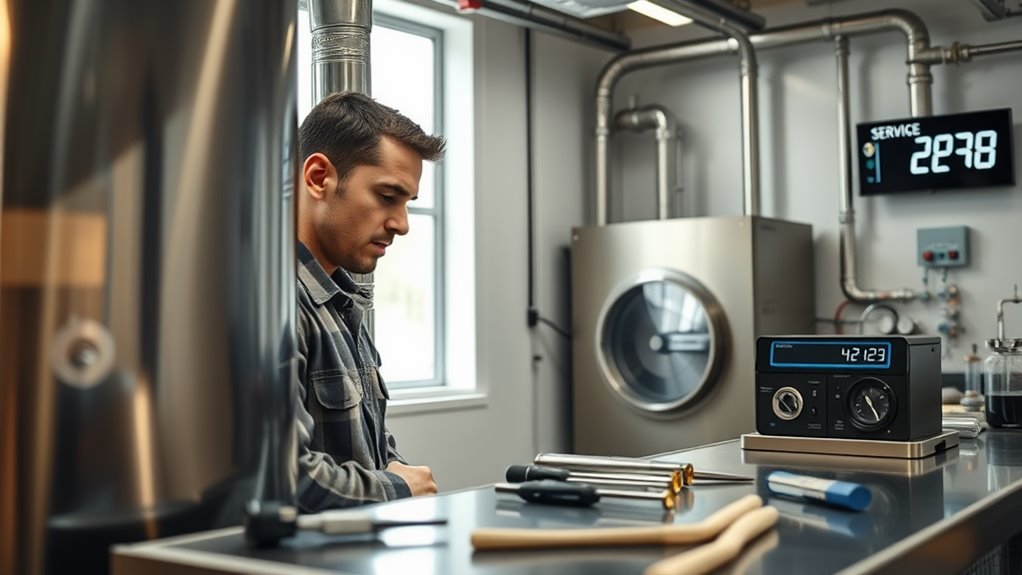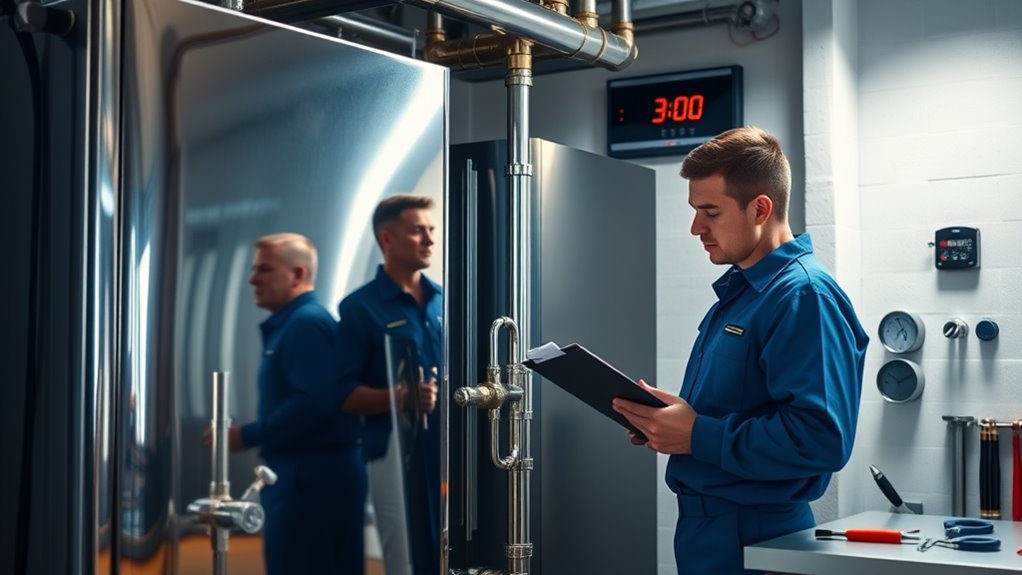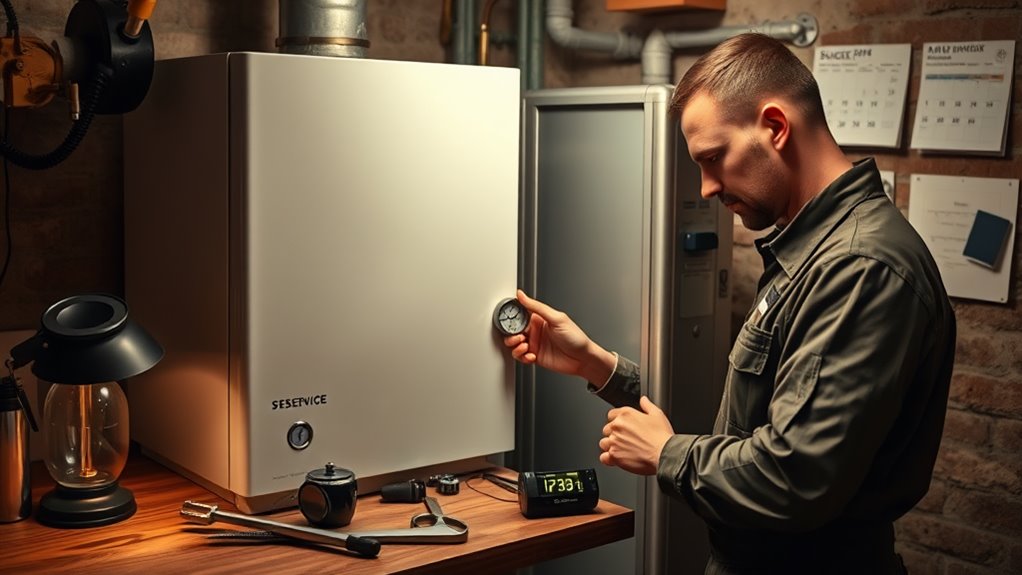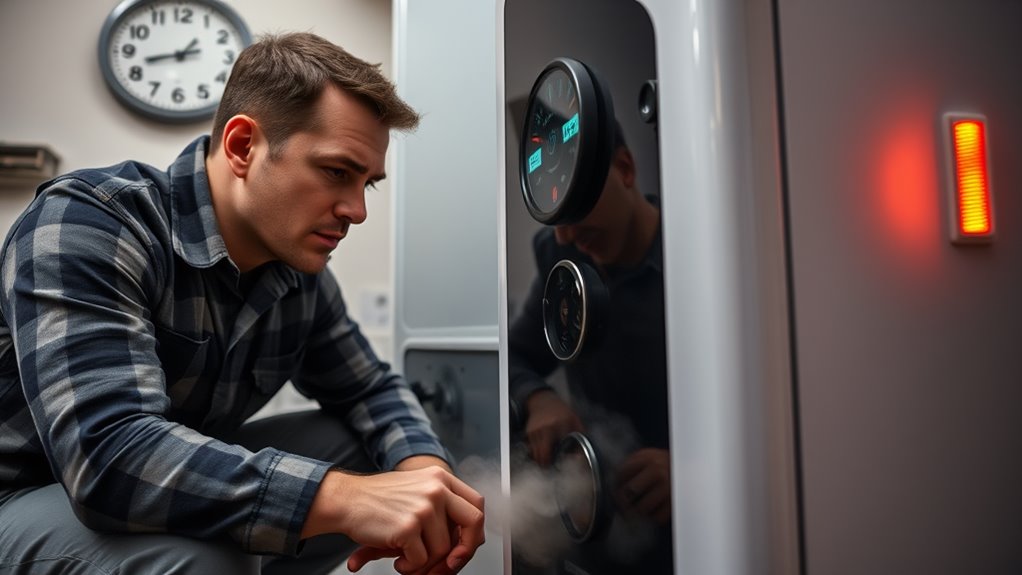A typical boiler service takes between 60 to 90 minutes. The duration can vary based on the complexity of your system and the technician’s experience. Technicians will check for leaks, inspect components like the burner and heat exchanger, and guarantee safety compliance. Factors such as system age and accessibility might influence how long it takes. Understanding what to expect during your service can help you prepare effectively for this essential maintenance task.
Key insights
- A typical boiler service lasts between 60 to 90 minutes, depending on the type and condition of the boiler.
- Factors like system complexity and technician experience can influence the overall service duration.
- Accessibility of the boiler may extend service time if it is difficult to reach.
- Technicians perform comprehensive checks, including cleaning components and testing safety devices during the service.
- Regular maintenance helps prevent issues and reduces the risk of costly repairs, ensuring efficient operation.
Understanding Boiler Service Basics

When you schedule a boiler service, it’s crucial to understand what the process entails and why it matters. Different boiler types, such as combi, system, and conventional boilers, have specific maintenance requirements. Regular servicing guarantees top performance, safety, and longevity of your system. The recommended service frequency varies; typically, you should arrange a check-up at least once a year. This helps identify potential issues before they escalate, which can save you money and prevent breakdowns. During the service, a qualified technician will inspect key components, check for leaks, and clean essential parts, guaranteeing your boiler operates efficiently. Knowing these basics enables you to make informed decisions about your heating system, enhancing its reliability and safety. Regular servicing also ensures compliance with UK gas safety regulations, providing peace of mind for both your business and customers.
Typical Duration of a Boiler Service

A typical boiler service usually takes between 60 to 90 minutes, depending on the boiler type and its condition. Understanding the time required for your service can help you plan better. Here’s what to expect during that timeframe:
- Inspection: Technicians check for any visible issues, including leaks and corrosion.
- Cleaning: They’ll clean components like the burner and heat exchanger to guarantee efficiency.
- Testing: The system will undergo tests to verify gas tightness and pressure levels.
- Documentation: Finally, you’ll receive a service report, outlining the work done and any recommended actions.
Regular service frequency is vital. Different boiler types may require distinct service intervals, so consulting your manufacturer’s guidelines is important. Additionally, regular maintenance can help enhance boiler performance and prolong the lifespan of your system.
Factors Affecting Service Time

Several factors can influence how long your boiler service takes. First, the service complexity plays a considerable role; older or more intricate systems may require additional time for thorough inspection and repairs. If your boiler has unique features or requires specialized knowledge, expect the service duration to extend.
Second, technician experience greatly impacts the timeframe. A seasoned technician can identify issues quickly and efficiently, reducing service time. In contrast, a less experienced technician might take longer to troubleshoot and resolve problems.
Lastly, accessibility of the boiler can also affect service time. If the unit is difficult to reach, the technician may need extra time to complete the service properly. Understanding these factors can help set realistic expectations for your boiler service duration. Proper preventative maintenance can also significantly reduce the time needed for servicing by ensuring that the system is in good condition prior to the technician’s arrival.
Importance of Regular Boiler Maintenance

Regular boiler maintenance isn’t just a recommendation; it’s vital for guaranteeing peak performance and longevity of your system. By adhering to a proper maintenance schedule, you can enhance your boiler efficiency and reduce the risk of costly repairs. Here’s why regular maintenance is essential:
- Improved Safety: Regular check-ups minimize the risk of hazardous leaks.
- Enhanced Efficiency: Well-maintained boilers operate more efficiently, lowering energy bills.
- Extended Lifespan: Timely servicing helps prevent premature system failure.
- Avoiding Breakdowns: Routine maintenance catches minor issues before they escalate.
Additionally, routine inspections by Gas Safe registered engineers ensure compliance with safety regulations, further protecting your business and its operations. Investing in regular maintenance not only keeps your boiler running smoothly but also guarantees a safe and comfortable environment in your home. Don’t overlook the importance of these services!
Signs Your Boiler Needs Attention

Boilers, like any other appliance, can exhibit signs of wear and tear that signal the need for attention. One of the most concerning indicators is boiler leaks; any visible water accumulation around your boiler should prompt immediate investigation. Leaks can indicate serious internal issues that, if left unaddressed, may lead to increased damage or safety hazards. Additionally, listen for strange noises coming from your boiler, such as banging, clanking, or gurgling sounds. These noises often suggest that there’s a buildup of pressure or air within the system, which requires prompt attention. If you notice any of these signs, it’s essential to consult a qualified technician to diagnose and resolve the underlying problems effectively. Ignoring these issues can escalate into costly repairs, especially if they lead to low water pressure that affects overall boiler performance.
What to Expect During a Boiler Service
During a boiler service, you can expect a thorough visual inspection of the unit and its components. The technician will conduct essential safety checks to guarantee everything operates safely and efficiently. Finally, they’ll implement efficiency testing methods to measure performance and identify any necessary adjustments. Additionally, the service may include a review of your Commercial Gas Safety Certificate to ensure compliance with safety regulations.
Visual Inspection Process
A thorough visual inspection is a crucial part of your boiler service, making certain that all components function safely and efficiently. During this process, the technician will follow an equipment checklist, focusing on key areas, including:
- Boiler condition – Checking for any signs of corrosion or damage.
- Pipes and connections – Inspecting for leaks or wear that could lead to failures.
- Ventilation – Confirming flues and vents are clear and unobstructed.
- Controls and gauges – Verifying that all indicators are functioning correctly.
This visual inspection not only identifies potential issues before they escalate but also helps maintain peak performance. By being proactive, you can save on costly repairs and make sure your boiler remains efficient throughout its lifespan. Additionally, regular preventive maintenance tips can enhance the longevity and reliability of your boiler system.
Safety Checks Conducted
Safety checks are essential components of an extensive boiler service, guaranteeing that your system operates securely and efficiently. During the service, a qualified technician will evaluate critical safety aspects, including gas leaks, pressure levels, and ventilation pathways. They’ll verify adherence to safety regulations, which are important for preventing hazardous situations. You can expect the technician to inspect safety devices, such as pressure relief valves and carbon monoxide detectors, confirming they function correctly. Their qualifications are significant; a certified technician has the necessary training to identify potential risks and address them effectively. By prioritizing these checks, you’ll not only enhance the longevity of your boiler but also maintain a safe environment for you and your family. Regular boiler maintenance can prevent issues like the Ea error code, ensuring peak efficiency and safety.
Efficiency Testing Methods
While your boiler’s safety is essential, its efficiency is equally important for ideal performance and energy savings. During a boiler service, expect the technician to follow specific testing protocols to assess efficiency metrics. Here’s what they typically check:
- Combustion Analysis: Measures the efficiency of fuel usage and emissions.
- Water Temperature: Guarantees the system maintains prime temperature settings.
- Flow Rate Testing: Evaluates the speed at which water circulates through the system.
- Pressure Checks: Confirms that pressure levels are within the manufacturer’s specifications.
These assessments help identify any inefficiencies, allowing for necessary adjustments that can improve your boiler’s performance and longevity. Additionally, technicians may consult error codes to pinpoint specific issues during the service process.
Frequently Asked Questions
Do I Need to Be Home During the Boiler Service?
You don’t necessarily need to be home during the boiler service, but it’s recommended for better communication. The technician will require access to your boiler and any related areas to guarantee a thorough inspection. Service duration expectations can vary, but most boiler services take about an hour. Being present allows you to address any questions or concerns on the spot, making sure you understand the boiler access requirements and the service performed.
Can I Schedule a Boiler Service on Weekends?
Yes, you can schedule a boiler service on weekends, depending on the provider’s weekend availability. Many companies offer scheduling flexibility to accommodate your needs. When booking, confirm their specific weekend hours and any additional fees that might apply. This way, you guarantee that your boiler gets the necessary maintenance without disrupting your weekday routine. Always check with your chosen service provider to see what options they have available.
What Qualifications Should the Technician Have?
When you’re looking for a technician, focus on their qualifications needed for servicing your boiler. Confirm they have relevant technician certification, typically from recognized organizations. This certification indicates they’ve undergone proper training and adhere to safety standards. It’s also wise to check for gas safe registration, particularly for gas boilers. A qualified technician not only guarantees efficient service but also assures your system operates safely and effectively, giving you peace of mind.
How Much Does a Boiler Service Typically Cost?
A boiler service typically costs between £50 and £100, depending on your location and the complexity of the system. To keep expenses in check, follow boiler maintenance tips like regular checks and cleaning. Service frequency recommendations suggest having your boiler serviced annually to catch issues early and maintain efficiency, potentially saving you money in the long run. Proper maintenance guarantees your system runs smoothly and reduces unexpected repair costs.
Is There a Warranty on the Service Provided?
When you’re considering a boiler service, it’s crucial to ask about warranty details. Most reputable companies offer service guarantees that cover specific issues for a set period. Make sure you clarify what’s included under the warranty, as it can vary between providers. Understanding these terms helps you ascertain that any necessary repairs post-service won’t come out of your pocket, providing peace of mind for your boiler maintenance needs.
Summary
In summary, understanding the typical duration and factors affecting boiler service can help you manage your expectations. A standard service usually takes about an hour, but complexities can extend this time. Regular maintenance is essential for your boiler’s efficiency and safety, so keep an eye out for any signs it may need attention. By knowing what to expect during a service, you can make certain your heating system remains reliable and performs at its best throughout the year.

